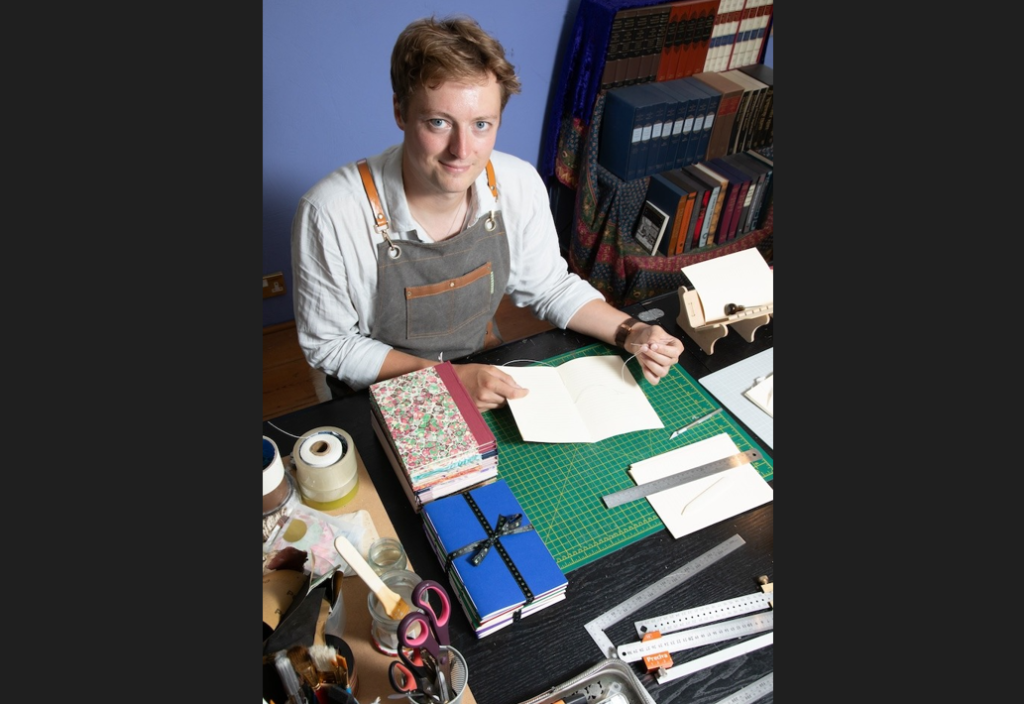Hugo Stevensen, once a promising neuroscientist, has embarked on a remarkable career change after attending a traditional bookbinding course. The 32-year-old, who had been halfway through a PhD in neuroscience, has swapped brain research for the art of bookbinding, launching a business called Aulwynd Bindery from his home in Suffolk.
Stevensen’s journey took a transformative turn in December 2022, when he attended a five-day beginners’ course at the Field Studies Council’s (FSC) Flatford Mill centre in Suffolk. The course, run by renowned bookbinder Mark Cockram, inspired Stevensen to turn his bookbinding hobby into a full-time business. Previously working on memory research, Stevensen had seen his role shift into artificial intelligence due to the pandemic, a change he did not enjoy.
“I was working on memory and the brain, but when the pandemic hit, I could no longer work with patients. I found myself delving into artificial intelligence and computing, and realised it wasn’t for me,” Stevensen explained. “That’s when I decided to pursue something I truly loved – bookbinding.”
Before attending the course, Stevensen had begun experimenting with bookbinding as a hobby, using a basic kit he bought online. However, the intensive training at Flatford Mill solidified his ambition. Taught by Cockram, a Fellow of Designer Bookbinders with 40 years of experience, the course provided hands-on experience in the craft, offering guidance to participants of all skill levels.
Stevensen praised the course for its resources and the opportunity to work closely with a master of the craft. “The equipment isn’t complicated, but it’s expensive, and having access to it was crucial. Plus, learning from someone like Mark, who is so talented and experienced, was incredible. He worked with each of us on a one-to-one basis, which was brilliant,” he said.
Since completing the course, Stevensen has established Aulwynd Bindery – named after an Anglo-Saxon word meaning “craft” – where he creates journals, sketchbooks, and exercise books, as well as restoring and repairing older books. His business has already attracted international attention, with commissions including 30 custom journals for a shop in New York and repairs for 19th-century photo albums from a local family.
Stevensen is now focused on building relationships with fine-print book publishers, who produce small runs of special leather-bound editions, while continuing to hone his skills. He also collaborates with Anna Brown, a marbled-paper artist, to create custom hardback notebooks with unique designs.
Looking to the future, Stevensen plans to further his expertise under Cockram’s guidance. “I’m constantly learning, and I’ll be returning to work with Mark again later this year. My goal is to master the full traditional skill set and create beautiful leather-bound books.”
Nathan Whittaker, the residential centre manager at FSC Flatford Mill, said the bookbinding course was part of a wider programme of arts and crafts courses aimed at helping people connect with nature and traditional skills. “It’s wonderful to hear Hugo’s success story. We hope to inspire more people to explore new skills and perhaps even new careers.”
FSC will host another beginners’ bookbinding course from 5 to 9 December, alongside other traditional craft workshops, including printmaking, silk scarf painting, and jewellery making.

